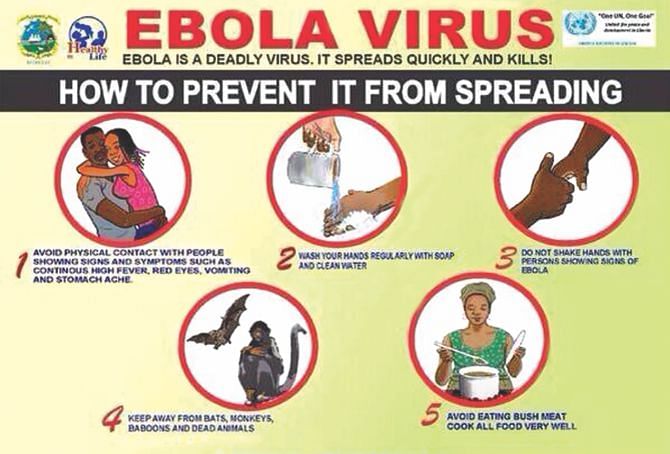Preparedness is key to our fight against Ebola
Preparedness is key to our fight against Ebola

WHO has declared the current outbreak of Ebola Virus Disease in some countries in West Africa a public health emergency of international concern. The main aim of this declaration is to contain the existing outbreaks and prevent further spread of Ebola through an internationally coordinated response. The declaration also serves as an international alert so that countries can prepare for any possible cases. It will help mobilize foreign aid and action to fight Ebola in affected countries. As of today, there are no cases of Ebola in the 11 countries of WHO's South-East Asia Region. This is the time to step up preparedness. A successful public health response will need strong health systems with sensitive surveillance, infection control and community mobilization.
Since 1976, when the Ebola virus was first detected in Africa, it has been responsible for several outbreaks within a few African countries. The virus moves from its natural reservoir to humans through animals. Ebola is associated with high mortality and no vaccine or cure is available at present.
The current outbreak of Ebola virus disease in the four West African countries Guinea, Liberia, Nigeria and Sierre Leone, has been ongoing for months. It has caused the highest number of cases and deaths and the widest geographical spread ever known for an Ebola outbreak. This complex outbreak involves multiple countries with a lot of cross-border movement among the communities. The large number of cases in peri-urban and rural settings makes this one of the most challenging Ebola outbreaks ever.
Though risk of spread of this disease to countries outside Africa is currently assessed to be low, there is an urgent need to strengthen national capacity for its early detection, prompt management and rapid containment. WHO believes that countries with strong health systems can quickly contain any imported cases using strict infection control measures.
While global focus is on Ebola, we must not forget that several pathogens have been and shall continue to threaten the world. Since the discovery of Ebola virus in 1976, more than 30 new pathogens have been detected. SARS and Influenza are two such pathogens which caused pandemics in this millennium. Fortunately, both could be contained in a short period.
The International Health Regulations, IHR (2005), call upon countries to be transparent in sharing information on diseases that may have the potential to move across countries to facilitate an international response. IHR regulations also specify, among others capacities, surveillance, response, laboratories, human-resource, risk communication and preparedness for early detection and prompt treatment.
The 2009 pandemic of influenza clearly demonstrated the importance of IHR (2005) as countries shared information on disease spread in real time to enable the global community to mount a coordinated response. Since the inception of IHR (2005), countries of WHO's South-East Asia Region have been striving to strengthen their national capacities. Substantial progress has been made. More work is yet to be done. Many countries have developed plans to achieve the desired level of competence before June 2016. To supplement the national efforts and address the gaps, WHO has established several networks of institutions of excellence and collaborating centres.
In the ongoing Ebola outbreak more than 100 WHO staff are deployed in the affected countries to support national health authorities. Hundreds of global experts have also been mobilized. An accelerated response is being implemented through a comprehensive plan in West Africa. WHO has sought international financial aid of USD 101 million to effectively implement this plan.
No infectious disease can be controlled unless communities are informed and empowered to protect themselves. Countries must provide accurate and relevant information to the public including measures to reduce the risk of exposure.
Ebola virus spreads through contact with body fluids of the patient. Avoiding this contact prevents transmission of infection. In communities and health care facilities, knowledge of simple preventive measures including hand hygiene and standard infection control precautions would be crucial to the national public health response.
WHO does not recommend imposing travel bans to or from the affected countries. A ban on travel could have serious economic and social effects on these countries. A core principle of IHR is the need to balance public health concerns without harming international travel and trade. The risk of infection for travellers is very low since person-to-person transmission results only from direct contact with the body fluids or secretions of an infected patient. People are infectious only once they show symptoms. Sick people are advised not to travel and to seek medical advice immediately if Ebola is suspected. All countries should be alert and have the capacity to manage travellers from Ebola-infected areas who have unexplained febrile illness.
Preparedness, vigilance and community awareness will be crucial to success in our fight against a complex public health emergency like Ebola. It will take effective national efforts to support an internationally coordination response.
The writer is Regional Director, WHO South-East Asia.